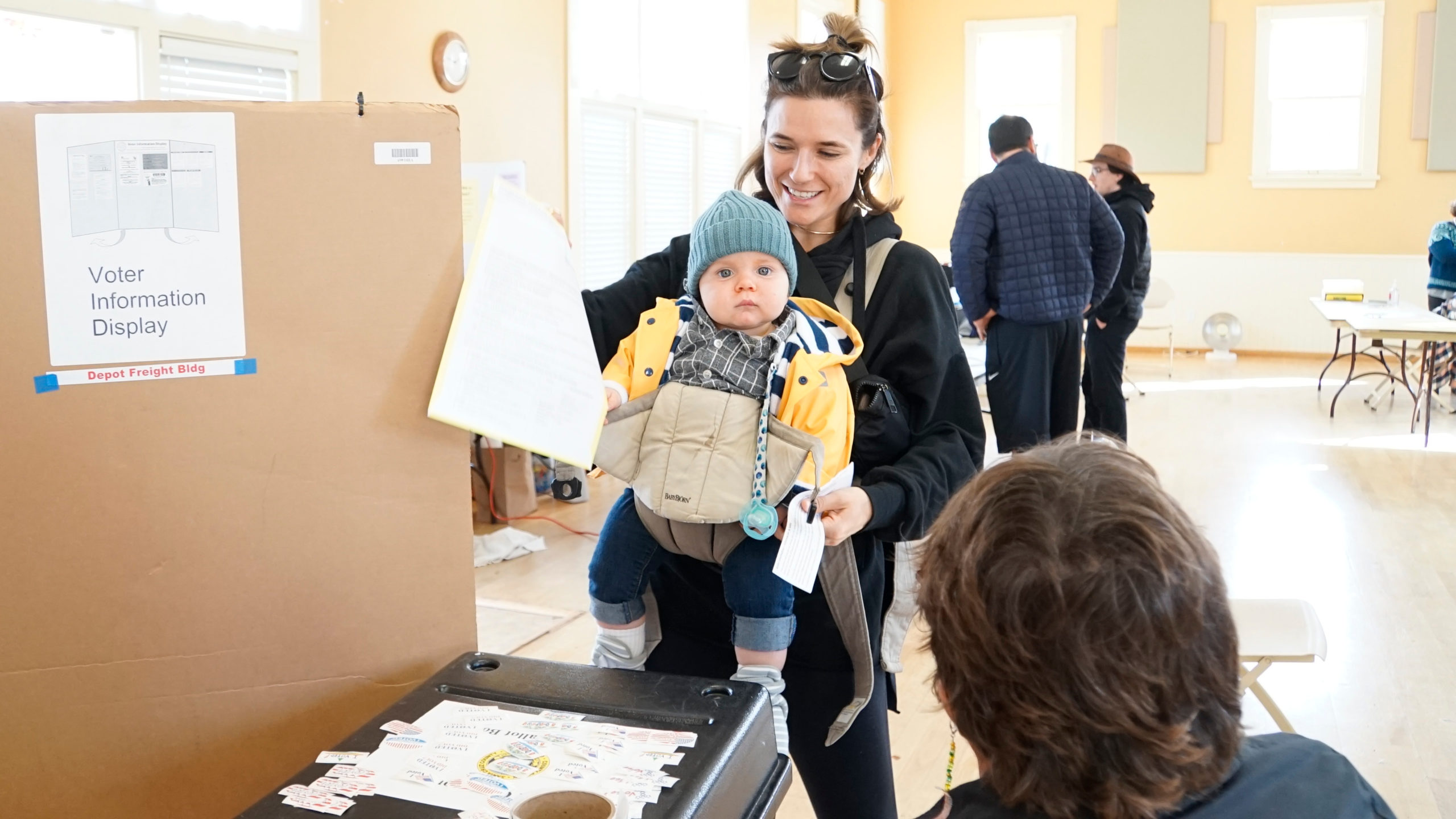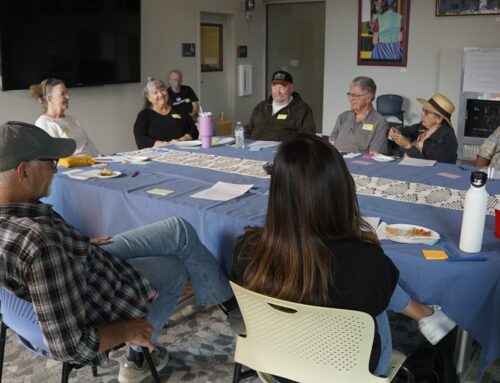
Santa Cruz voter Rachael Tipping, 36, submits her ballot Nov. 8, 2022 at the Depot Park vote center in Santa Cruz. (Kara Meyberg Guzman — Santa Cruz Local)
SANTA CRUZ >> Two bond measures that would fund school repairs and upgrades in Santa Cruz City Schools were approved by voters, according to official election results posted Dec. 6. Local measures M, P, Q, R and S also were adopted.
- Measures K and L would raise a tax on homeowners in Santa Cruz City Schools boundaries to mainly to fund school repairs and upgrades.
- Measure M would create a parcel tax for homeowners in the Loma Prieta Joint Union Elementary School District.
- Measure P would raise taxes on hotel rooms, motel rooms and short-term rentals in the city of Santa Cruz.
- Measure Q would preserve Watsonville’s established urban limit lines through the year 2040.
- Measure R would raise the sales tax in Watsonville to 9.75% from 9.25%.
- Measure S would preserve Watsonville’s established urban limit until 2040 and provide a path for some future development outside of the boundary.
- Measure T would create a parcel tax for homeowners in the Boulder Creek Recreation and Park District to update and add district facilities.
For results of Measure N, the City of Santa Cruz empty home tax measure, and Measure O, the City of Santa Cruz Downtown Library initiative, read these related stories.
Measure K: City of Santa Cruz High School and Middle School Bond – 55% to pass
| Vote | Total | |
|---|---|---|
| Bonds Yes | 33156 (66.76%) | |
| Bonds No | 16508 (33.24%) |
Measure L: City of Santa Cruz Elementary School Bond – 55% to pass
| Vote | Total | |
|---|---|---|
| Bonds Yes | 17856 (71.21%) | |
| Bonds No | 7219 (28.79%) |
Measures K and L would raise money to repair, modernize and construct new buildings at 10 Santa Cruz City Schools sites. Voters in Santa Cruz City Schools boundaries will decide the measures. The measures each require more than 55% of the vote for approval.
Measures K and L would raise taxes on homeowners and allow the school district to issue $371 million in bonds. Measure L would benefit Santa Cruz City Schools’ elementary district. Measure K would provide money for the middle, high and alternative school district. About 5% of the bond money also would pay for 80 units of housing for employees of Santa Cruz City Schools, school district leaders said.
Measure M: Loma Prieta Joint Union School District Parcel Tax – 2/3 to pass
Last updated: 2:10 p.m. Wednesday, Dec. 7. These are final, official results from Santa Cruz and Santa Clara counties.
| Vote | Total | |
|---|---|---|
| Yes | 1,716 (67.32%) | |
| No | 833 (32.68%) |
(Source: Santa Clara County Clerk’s Office and Santa Cruz County Clerk’s Office)
Measure M would create an annual parcel tax of $348 for homeowners in the Loma Prieta Joint Union Elementary School District. The tax would start July 1, 2023 and expire after eight years. Residents 65 and older and those with low incomes could apply for an exemption.
District leaders expect the tax to raise $640,000 annually. According to the measure, uses for the money include:
- Teacher retention.
- Academic programs and classroom technology.
- Instructional materials.
The measure needs more than a two-thirds vote to pass.
Measure P: City of Santa Cruz Hotel and Vacation Rental Tax – Majority to pass
| Vote | Total | |
|---|---|---|
| Yes | 19437 (80.61%) | |
| No | 4675 (19.39%) |
Measure P would raise taxes on hotel rooms, motel rooms and short-term rentals in the city of Santa Cruz.
Measure P would:
- Increase the tax on hotels and motels to 12% from 11% and increase the tax on short-term rentals to 14% from 11%. The increases are identical to those approved by Santa Cruz County voters in June for unincorporated county areas.
- Bring in about $1.4 million each year, according to preliminary estimates. The money would be used as “flexible funding” that could support city services including wildfire prevention, public safety and affordable housing, said Santa Cruz Mayor Sonja Brunner. However, the proposal does not legally tie the money to a specific service.
- The measure needs more than 50% of the vote to pass. If approved by voters, the new taxes would start Jan. 1.
Measure Q: Keep the Watsonville Urban Limit Line – Majority to pass
| Vote | Total | |
|---|---|---|
| Yes | 5757 (67.77%) | |
| No | 2738 (32.23%) |
Measure Q is a voter initiative led by a community group called the Committee for Planned Growth and Farmland Protection. The initiative would amend Measure U, which was approved by Watsonville voters in 2002 to establish a boundary for the city’s development. Measure U’s goal was to prevent urban sprawl in surrounding farmlands and wetlands. Some portions of that boundary are set to expire in November. Other parts of the boundary line will dissolve in 2027.
Measure Q would keep the established urban limit lines through the year 2040.
Measure R: Watsonville Sales Tax Hike – Majority to pass
| Vote | Total | |
|---|---|---|
| Yes | 5580 (64.4%) | |
| No | 3084 (35.6%) |
Measure R would add a 0.5% sales tax to the current 9.25% sales tax on goods purchased in Watsonville. Groceries and prescription medicine are exempt from sales tax.
Measure R, or the City of Watsonville Community Investment Tax Measure, would provide a projected $5.1 million to Watsonville’s General Fund by raising the city’s sales tax to 9.75% from 9.25%. The tax is meant to address many residents’ stated needs of more community infrastructure and social programs. Money is supposed to be prioritized for those services, but the money will go into the city’s General Fund where it is not legally bound for any specific use. The measure needs more than 50% of the vote to be adopted.
Measure S: Add Flexibility to the Watsonville Urban Limit Line – Majority to pass
| Vote | Total | |
|---|---|---|
| Yes | 4286 (50.06%) | |
| No | 4275 (49.94%) |
Measure S would preserve Watsonville’s established urban limit until 2040 and provide a path for some future development outside of the boundary. The measure would allow the Watsonville City Council to identify areas outside of the limit for potential development during the city’s General Plan update.
A “yes” vote on Measure S means the city would maintain the urban limit line and allow for possible development outside those limits through the 2050 General Plan. Through that process, the city could explore housing and commercial opportunities outside of the current boundaries.
A “no” vote on Measure S would keep the status quo. Some portions of the urban limit line would expire in November and other parts of the boundary line would dissolve in 2027.
If Measure S does not pass and Measure Q passes, the city would not be able to annex any new land for development.
If Measures Q and S fail, the urban limit line portion that expires in November would expire. Development possibilities would open along that line. If both measures fail, portions of the boundary line set to expire in 2027 would still expire in 2027. Farmlands and wetlands west of Highway 1 would continue to be protected from development under a 2000 agreement between Watsonville, Santa Cruz County and the Coastal Commission.
If both measures get more than 50% of the vote, the measure with the most votes wins, Watsonville’s city attorney said during a July 7 Watsonville City Council meeting.
Measure T: Boulder Creek Recreation and Park District Parcel Tax – 2/3 to pass
| Vote | Total | |
|---|---|---|
| Yes | 2458 (57.51%) | |
| No | 1816 (42.49%) |
Measure T would create an annual parcel tax of $36 per parcel for homeowners in the Boulder Creek Recreation and Parks District. According to the resolution, the money would go toward parks and recreation facilities, including:
- “Green energy solutions.”
- American Disabilities Act accessibility upgrades.
- New outdoor public restrooms at Junction Park.
The measure needs more than a 66% vote to pass. If approved, the tax would expire in 30 years.
Questions or comments? Email [email protected]. Santa Cruz Local is supported by members, major donors, sponsors and grants for the general support of our newsroom. Our news judgments are made independently and not on the basis of donor support. Learn more about Santa Cruz Local and how we are funded.
Kara Meyberg Guzman is the CEO and co-founder of Santa Cruz Local. Prior to Santa Cruz Local, she served as the Santa Cruz Sentinel’s managing editor. She has a biology degree from Stanford University and lives in Santa Cruz.





